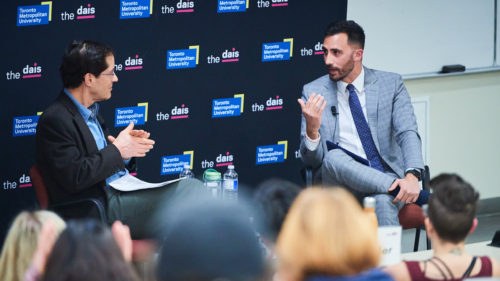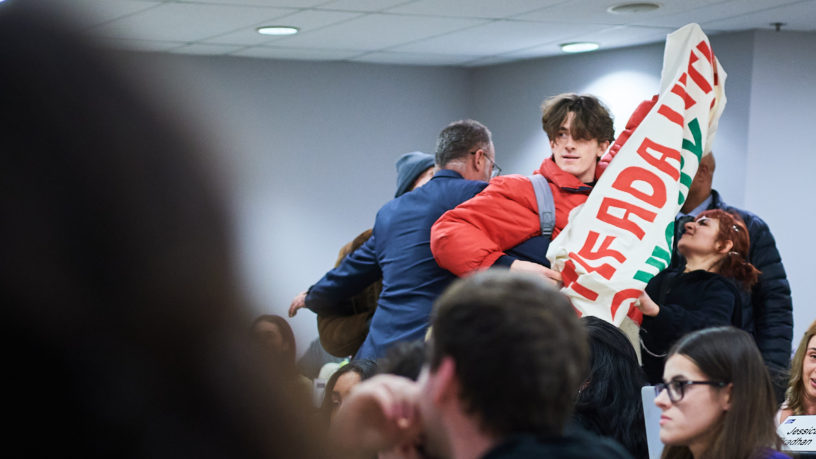By Anastasia Blosser and Gabriela Silva Ponte
Answers have been edited for length and clarity.
The Dais held its first democracy forum of 2024 with Ontario’s Minister of Education Stephen Lecce.
Approximately 10 minutes into the forum, protesters entered the room chanting and holding banners in support of Palestine. They condemned some of Lecce’s recent remarks and actions regarding the war in the Middle East before being escorted out by unidentified security.
Since the war began, Lecce has shared his support for Israel on his personal social media accounts and during legislative assembly meetings. He has also asked Toronto District School Board teachers to remain neutral online. In a memo sent to school boards, Lecce said, “There is no room for influence of personal opinions or personal world views in Ontario classrooms.”
The event was held on the ninth floor of the Ted Rogers School of Management from 7 p.m. to 8 p.m. on Monday. Approximately 40 community members joined Lecce at Toronto Metropolitan University.
Provost and Vice-President, Academic Roberta Iannacito-Provenzano began the event by congratulating The Dais on their 30th democracy forum.
The forum then proceeded as host Martin Regg Cohn—who founded The Dais’ democracy forums and is currently a member at the organization—asked Lecce questions regarding his leadership, policies and values. The event then opened a question period from the audience.
“The great thing about the politician sitting beside me is that we agree on almost nothing,” Regg Cohn said, introducing Lecce.

Regg Cohn: Why did you become a Conservative? And how did you know when you were 13-years-old that you were a Conservative?
Lecce: I didn’t come from a political background. My parents are immigrants from Italy so I wasn’t raised in a political experience. We didn’t really talk politics at the table, but intrinsically I think many immigrant values overlap and align with progressive conservative values. The fundamental morals my parents raised me with were to work hard, to be productive, law abiding, to love my family and to be proud of my country. I think those are fundamental values that I subscribe to today—they are moderate conservative values.
Regg Cohn: You went to Tunisia in 2014. I’ve been there as a foreign correspondent and saw the elections, which were not free and fair. So when you were there in 2014, what did you see? And what lessons did you come away with?
Lecce: The overwhelming majority of people will live in a place where free speech, political association and free press are entirely denied. In Tunisia, I remember seeing and working with party aspirants and these are people who’ve never debated, never been in a television commercial. They’ve never really been able to do this because this is not permitted in a dictatorial regime. The people I met there were so grateful, because they longed for freedom. So, Tunisia was where that spark lit for democracy.
Regg Cohn: How do you reconcile what you saw in Tunisia with the indifference and apathy we so often see here? In the last election, the electoral turnout was the lowest level ever.
Lecce: We have rule of law, a constitutional Charter of Rights and the freedoms of a bill of rights. We have protections that safeguard us and there are people who have no basic standards of liberty or citizenship. It’s also the greatest exercise for Canadians to realize how privileged we are and to go to one of these nations where that democratic expression is not there. When I went abroad, I realized that we have a lot to fight for in this country, we have skin in the game.
Regg Cohn: You’ve made some changes to Ontario’s educational curriculum. How are they working and can we judge it in the next election?
Lecce: We’re making the civics and careers courses relevant. Is it fair to say for most of you that civics and careers was a “bird course?” What I noticed in the civics course is that it was so heavily dosed in theory and a lack of relevant application for young people and how to be the agent of change. So we’ve modernized this to make it relevant to what young people really need to know. We’ve introduced a specific section that deals with critical thinking skills, deductive reasoning and how to really fully argue, to challenge assumptions and how to really do your due diligence as a thoughtful person. And we’ve included new sections in civics to do with contemporary forms of threats to democracy.
Regg Cohn: What are your responsibilities as minister of education to direct a number of school boards to deal with racism that manifests itself? How do you teach tolerance to educators and administrators who aren’t doing their job?
Lecce: We’re teaching the values fundamentally, which is one of the tactics to deliver on this strategic imperative of having people be respectful to each other. We worked on curriculum reforms and professional development. We leverage communities who have lived experiences, that perhaps no others may have experienced, to come in and teach to kids. We’re trying to help universalize knowledge around our history to help build a better future.
Audience member: With the easy access to a variety of different AI models, how will the curriculum change to make sure students aren’t spending long periods learning something that they can easily access within seconds?
Lecce: I think this is probably one of the most pressing issues facing the government right now. I think we have to harness that power of AI for productive goods. I think the challenge is that it just sort of exploded. Governments and societies and academia, everyone was all caught a bit off guard. Like, where did this come from? And how do we counter that? How do we create a regime that permits ethical use? Because obviously it can be incredibly advantageous for students. For me, it’s an open dialogue.
Audience member: It has been well documented that public school employers and school boards are experiencing real challenges, recruiting and retaining qualified workers to staff the system, particularly in locations like the Greater Toronto Area which have been seeing significant increases in the cost of living. Will this profession pay the bills in big cities where the cost of living goes through the roof and there is a possibility that suddenly teachers won’t be able to afford to live where the students live?
Lecce: We have now negotiated deals that have permitted wages to keep going up. And that includes education workers. This is a challenge for governments because we’ve seen shortages and not just in education. So I think everyone in the public and private sector is figuring out how to make a system that gives them incentive to retain and also sponsor childcare.
Audience member: From my understanding, you’ve expressed support for the parental rights movement, which has debated the importance of 2SLGBTQIA+ education in classrooms as well as lobbied for parental consent regarding preferred first names for transgender non-binary kids. I was just wondering if you’re concerned about the unsafe environment that might pose for trans kids?
Lecce: First of all, we have not made any policy changes that expressed opposition. My belief is the overwhelming majority of parents love their kids and want to support them. You can protect children from abusive and exploitative circumstances, which the school boards already do. You can keep kids safe while also empowering parents to know what’s going on in their kids’ lives. I don’t want to pretend that the parents should not be involved in the life of their child through curriculum.
Aasimulhaq Ahwaja, a first-year computer science student, attended the event to ask Lecce questions about the federal government’s cap on international students, voter dissatisfaction and curriculums related to the 2SLGBTQIA+ community.
Ahwaja said he felt like very few of the questions were actually answered, but is still optimistic.
“This is a young person who is a minister and [that] gives me hope as a young guy who is thinking about [going] into politics. That is what is important; that the young ones get involved.”












Leave a Reply